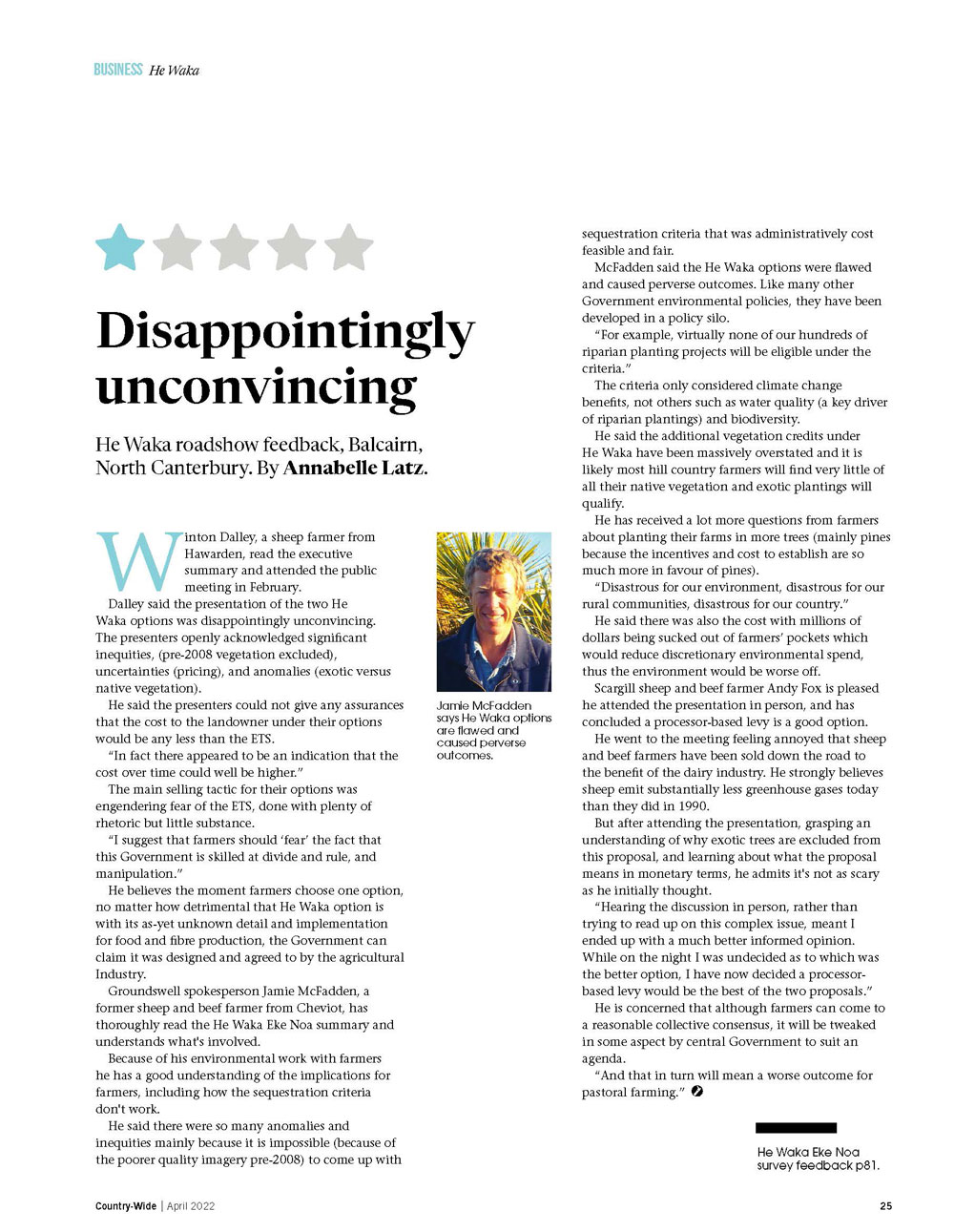Country Wide Magazine, April 2022
He Waka roadshow feedback, Balcairn, North Canterbury. By Annabelle Latz.
Winton Dalley, a sheep farmer from Hawarden, read the executive summary and attended the public meeting in February. Dalley said the presentation of the two He Waka options was disappointingly unconvincing. The presenters openly acknowledged significant inequities, (pre-2008 vegetation excluded), uncertainties (pricing), and anomalies (exotic versus native vegetation). He said the presenters could not give any assurances that the cost to the landowner under their options would be any less than the ETS.
“In fact there appeared to be an indication that the cost over time could well be higher.”
The main selling tactic for their options was engendering fear of the ETS, done with plenty of rhetoric but little substance. “I suggest that farmers should ‘fear’ the fact that this Government is skilled at divide and rule, and manipulation.” He believes the moment farmers choose one option, no matter how detrimental that He Waka option is with its as-yet unknown detail and implementation for food and fibre production, the Government can claim it was designed and agreed to by the agricultural Industry. Groundswell spokesperson Jamie McFadden, a former sheep and beef farmer from Cheviot, has thoroughly read the He Waka Eke Noa summary and understands what’s involved.
Because of his environmental work with farmers he has a good understanding of the implications for farmers, including how the sequestration criteria don’t work. He said there were so many anomalies and inequities mainly because it is impossible (because of the poorer quality imagery pre-2008) to come up with sequestration criteria that was administratively cost feasible and fair. McFadden said the He Waka options were flawed and caused perverse outcomes. Like many other Government environmental policies, they have been developed in a policy silo.
“For example, virtually none of our hundreds of riparian planting projects will be eligible under the criteria.”
The criteria only considered climate change benefits, not others such as water quality (a key driver of riparian plantings) and biodiversity. He said the additional vegetation credits under He Waka have been massively overstated and it is likely most hill country farmers will find very little of all their native vegetation and exotic plantings will qualify. He has received a lot more questions from farmers about planting their farms in more trees (mainly pines because the incentives and cost to establish are so much more in favour of pines).
“Disastrous for our environment, disastrous for our rural communities, disastrous for our country.”
He said there was also the cost with millions of dollars being sucked out of farmers’ pockets which would reduce discretionary environmental spend, thus the environment would be worse off. Scargill sheep and beef farmer Andy Fox is pleased he attended the presentation in person, and has concluded a processor-based levy is a good option. He went to the meeting feeling annoyed that sheep and beef farmers have been sold down the road to the benefit of the dairy industry. He strongly believes sheep emit substantially less greenhouse gases today than they did in 1990. But after attending the presentation, grasping an understanding of why exotic trees are excluded from this proposal, and learning about what the proposal means in monetary terms, he admits it’s not as scary as he initially thought.
“Hearing the discussion in person, rather than trying to read up on this complex issue, meant I ended up with a much better informed opinion. While on the night I was undecided as to which was the better option, I have now decided a processor- based levy would be the best of the two proposals.”
He is concerned that although farmers can come to a reasonable collective consensus, it will be tweaked in some aspect by central Government to suit an agenda.
“And that in turn will mean a worse outcome for pastoral farming.”
See the article online here

